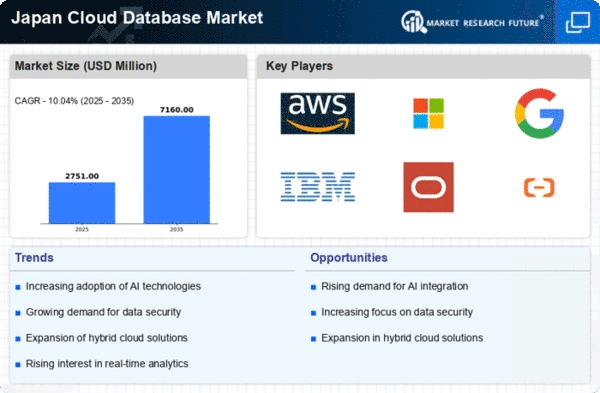Increased Focus on Data Analytics
In Japan, the cloud database market is significantly influenced by the growing emphasis on data analytics. Organizations are increasingly recognizing the value of data-driven decision-making, leading to a surge in the adoption of cloud databases that facilitate advanced analytics capabilities. The integration of artificial intelligence (AI) and machine learning (ML) into cloud databases enhances their analytical power, enabling businesses to derive actionable insights from vast amounts of data. This trend is expected to contribute to the cloud database market's growth, with projections indicating a potential market size of $1.2 billion by 2025. As companies strive to leverage data for competitive advantage, the demand for cloud databases equipped with robust analytics features continues to rise.
Rising Demand for Scalable Solutions
The Cloud Database Market in Japan experiences a notable surge in demand for scalable solutions. As businesses expand, the need for databases that can grow alongside them becomes paramount. This trend is particularly evident in sectors such as e-commerce and finance, where data volumes are increasing exponentially. According to recent estimates, the cloud database market is projected to reach approximately $1.5 billion by 2026, reflecting a compound annual growth rate (CAGR) of around 20%. Companies are increasingly seeking cloud databases that offer flexibility and scalability, allowing them to manage large datasets efficiently. This rising demand for scalable solutions is a key driver in the cloud database market, as organizations prioritize agility and responsiveness to market changes.
Emergence of Industry-Specific Solutions
The cloud database market in Japan is witnessing the emergence of industry-specific solutions tailored to meet the unique needs of various sectors. Industries such as healthcare, finance, and retail are increasingly adopting cloud databases designed to address their specific regulatory and operational requirements. This trend is driven by the recognition that one-size-fits-all solutions may not adequately serve the diverse needs of different industries. As a result, cloud database providers are developing specialized offerings that enhance compliance, security, and performance for specific sectors. This focus on industry-specific solutions is likely to propel growth in the cloud database market, as organizations seek databases that align closely with their operational demands and regulatory frameworks.
Growing Need for Disaster Recovery Solutions
In the context of Japan's cloud database market, the increasing need for disaster recovery solutions emerges as a critical driver. Given the country's susceptibility to natural disasters, organizations are prioritizing data protection and recovery strategies. Cloud databases offer robust disaster recovery options, ensuring business continuity in the face of unforeseen events. This heightened awareness of data resilience is prompting companies to invest in cloud database solutions that provide reliable backup and recovery capabilities. The market for disaster recovery services within the cloud database sector is projected to grow, reflecting a broader trend towards ensuring data integrity and availability. As businesses recognize the importance of safeguarding their data, the demand for cloud databases with comprehensive disaster recovery features is expected to rise.
Government Initiatives Supporting Cloud Adoption
The cloud database market in Japan benefits from various government initiatives aimed at promoting cloud adoption across industries. The Japanese government has implemented policies to encourage digital transformation, which includes the migration of traditional databases to cloud-based solutions. These initiatives are designed to enhance operational efficiency and foster innovation within the public and private sectors. As a result, organizations are increasingly turning to cloud databases to comply with government regulations and leverage available incentives. This supportive regulatory environment is likely to drive growth in the cloud database market, as businesses seek to align with national strategies for technological advancement.
















